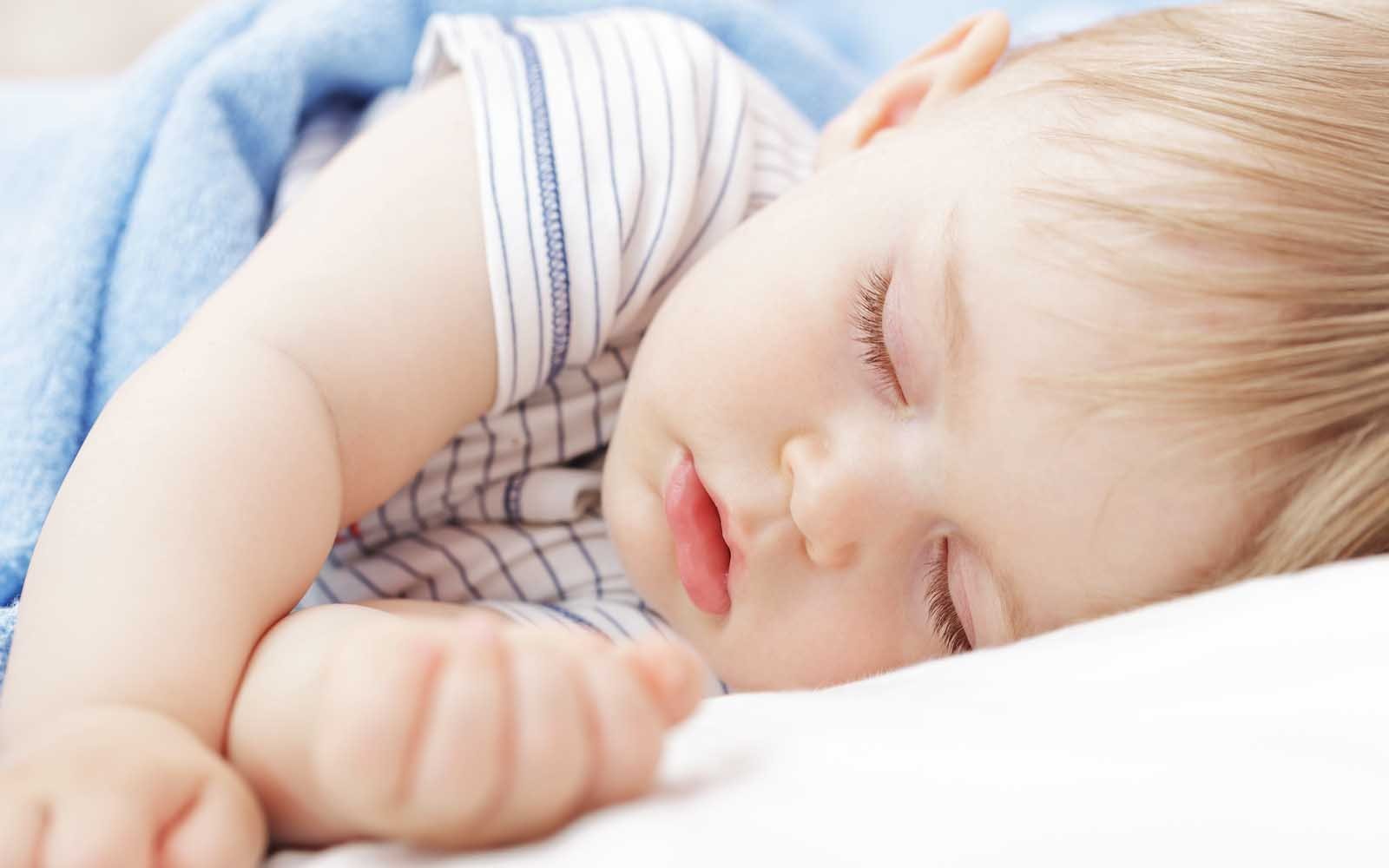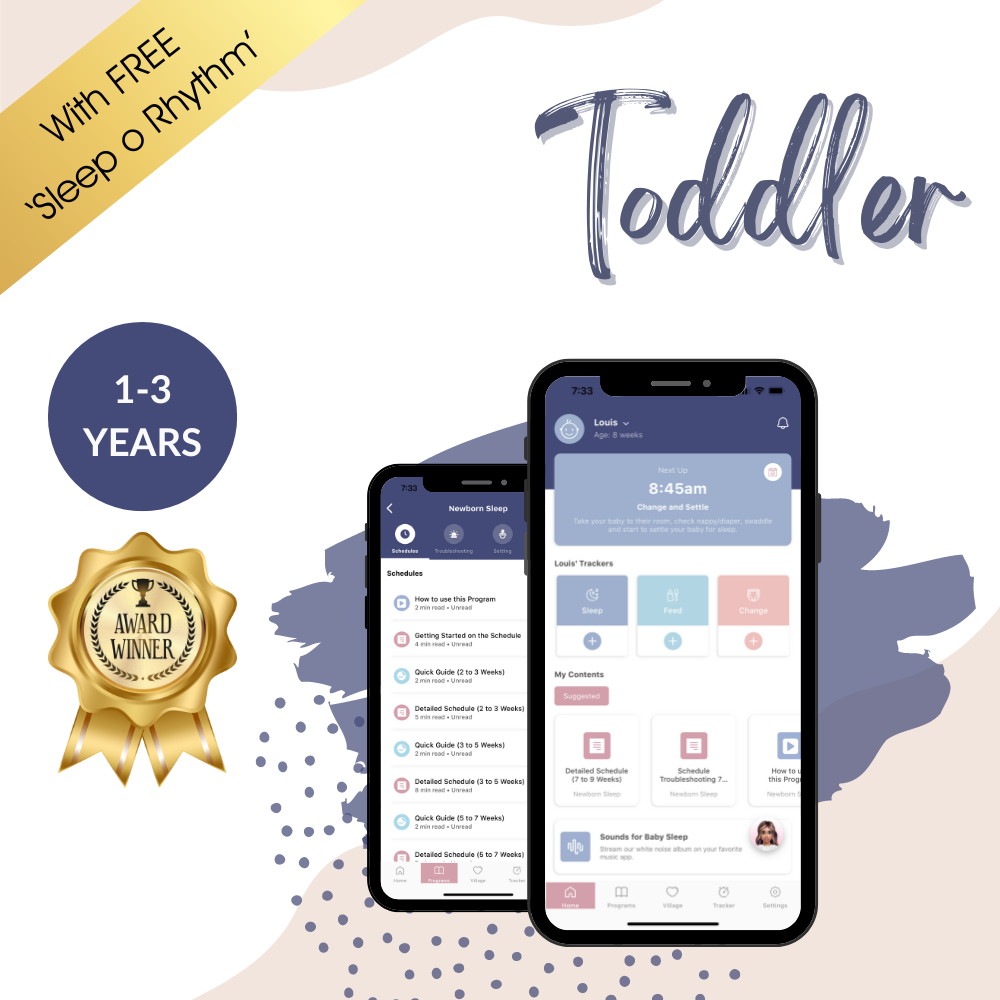
When Do Babies Sleep Through The Night?
This is what we all aspire to isn't it? The golden trophy of parenthood: your baby "sleeping through the night".
Your neighbour’s 6 week old was sleeping through the night, your sister-in-law's baby has to be woken every morning or she'd keep sleeping! You’re wondering if there is a light at the end of the tunnel for your baby or if you’ve missed the boat entirely…
We can help you.
But first, a disclaimer: we're NOT telling you your baby must be able to sleep through the night by a certain age, nor that you should expect your newborn to do a full 12 hours straight.
The fact is, no one sleeps all night. All humans big or small rouse between sleep cycles all night long.
With babies, they are certainly capable of sleeping longer stretches if all the factors line up right for them. This article is about ticking all the boxes to give your baby the best chance of sleeping better at night, when they're ready to.
In this article:
- What does "sleeping through the night" mean?
- When do babies sleep through the night?
- How to get your baby to sleep through the night
- Reasons your baby might be waking at night
Struggling with overnight wakes?
We can help you get more sleep! With the customised sleep schedules, gentle settling methods and personalised support available in our Little Ones App, you and your little one will soon be sleeping soundly.
Get our Baby Sleep App
What does "sleeping through the night" mean?
You might be surprised to learn that "sleeping through the night" doesn't actually mean sleeping right through from bedtime to morning without waking. Most research actually defines "sleeping through the night" as sleeping for 6 to 8 hours straight.
So if your baby slept 9 hours without waking or if your newborn slept 7 hours without feeding, they are already "sleeping through the night", woohoo! Even if your baby is waking twice, if they are managing a 6 hour stretch of sleep in between those wakes, they too are technically "sleeping through the night".
Not quite what you imagined?
You're not alone! Most parents do think of "sleeping through the night" as sleeping right through from bedtime until morning. And that is still achievable, but it can take a little longer... Certainly once your baby is capable of linking sleep cycles, they can start sleeping for longer uninterrupted stretches.
When do babies sleep through the night?
A baby’s ability to sleep through the night depends on many factors – their daily milk and food intake, their sleep environment, how much day sleep they’ve had, whether they’re able to settle themselves to sleep (in babies older than 4 months)... and more!
If all of those factors are lined up though, some babies start sleeping for longer stretches as early as 6 weeks old, especially if their feeding and nap routines are well established. It can, and does, happen! In fact, when I brought my youngest baby home from hospital, she slept for 9 hours straight every night, going to bed at 7pm and waking for a feed around 4am.
Now, whenever we talk about newborn babies sleeping for long periods overnight we get comments saying "you can't let a newborn sleep that long at night, you should be waking your baby to feed them". And yes, for some babies this is true.
If your baby hasn't regained their birth weight or if they are having trouble feeding or gaining weight, your doctor or health nurse will probably recommend that you wake your baby to feed them every 3-4 hours at night. If you've been given the all clear from your medical team though and your baby is gaining weight well, there's no reason to wake them. They will wake naturally for a feed when they are hungry.
What you can do is make sure everything is lined up to give your baby the best possible chance of sleeping longer... the rest is up to them!
The American Academy of Pediatrics recommends room-sharing without bed-sharing for at least the first 6 months to reduce the risk of SIDS and support healthy sleep development.
How can I get my baby to sleep through the night?
There are many factors that contribute to your baby sleeping well at night, some are within your control and some are not, for example, your baby's age, size or developmental ability.
Let’s take a look at the factors you DO have control over, in the hope that it might help you and your baby towards a full night sleep, because establishing healthy sleep habits early on can make a big difference in how well your baby sleeps at night.
Make sure your baby has a full tummy!
Feeding your baby enough during the day will mean they need to feed less at night, since babies have a specific number of calories they need to consume within a 24-hour period.
If you have an overly sleepy baby or let them nap too much in the day they won’t have fed as much as they need to and will have to make up for that during the night. Hungry babies also don’t settle or sleep well. So making sure your baby has had enough milk/solids in the day really helps their chances of sleeping at night.
For babies under 6 months, you can try implementing a "dream feed" to help them sleep for longer. This is where you feed your baby before you go to bed, while they are still drowsy or asleep.
For babies established on solids, giving them protein at their LUNCH meal can also help them stay full through the night, due to the way the protein is stored in your baby’s body at this time.
Remember that most babies will still need to have milk in the night until they are well established on solids, and this might not happen until closer to 8 months old. This is completely normal! If your baby is feeding overnight and still having a good breakfast milk feed the next morning, this indicates that they are waking genuinely hungry at night.
Say goodbye to sleepless nights.
Join over 800,000 families worldwide who are enjoying excellent sleep with our Sleep App, created by experts in the field of pediatric sleep.
Get our Baby Sleep App
Has your baby had too much or too little day sleep?
An overtired baby who hasn’t had enough sleep during the day will be harder to settle and can sleep worse. This is due to a build up of the stress hormone cortisol, which acts like adrenaline in your baby’s body, inhibiting good quality sleep. A baby who has napped poorly will generally have a restless night’s sleep and/or an early morning wake.
On the other hand, too much day sleep can also lead to poor nights. Day and night sleep is intrinsically linked, so, quite simply, if your baby has too many of their sleep hours for that 24-hour period during the day, they will naturally sleep less at night. It is a very delicate balance!
Our Baby Sleep App takes the guesswork out of how much sleep is the right amount for your baby by providing age-appropriate, customized nap schedules, along with comprehensive troubleshooting notes for when things don't go to plan.
Is your baby startling awake?
If your baby is younger than 5 months and not rolling yet, swaddling them will help to ensure they sleep more peacefully and for longer. Swaddling replicates the tight confined feeling of being in the womb that babies are used to and helps to suppress their startle reflex.
Quite often, we hear people say their baby doesn’t like being swaddled because they cry or squirm during the process. This is often due to the fact that their baby is already overtired by this stage and is literally fighting ANYTHING! It can also be because the swaddle is not the right type for them. Some babies prefer to be swaddled with their arms up and others prefer arms down.
Swaddling is proven to help your baby sleep for longer and means they can’t wake themselves up with their startle reflex so if your baby is not rolling yet, it's worth persevering to find a swaddle that works for them. Once your baby is rolling, you can transition to an arms-out baby sleeping bag.
Is your baby too hot or cold?
Babies are really sensitive to temperature, as they are unable to effectively regulate their own body temperature until they’re older. The ideal room temperature for a baby to sleep in is between 18-20 degrees Celsius (64-68 degrees Fahrenheit). Making sure your baby is nice and warm, but not too hot, is a crucial element in them sleeping well. Keeping your baby's room at the ideal temperature and avoiding overheating can also help reduce the risk of SIDS.
We recommend always dressing and swaddling your baby with natural fibers only – cotton, wool, merino or bamboo. These fabrics allow your baby’s skin to breathe and reduce the risk of them overheating. Never use polyester, fleece, polar fleece or other synthetic or man-made fabrics in your baby’s bed.
Using a baby or toddler sleeping bag is a great way to ensure your wee one stays cosy all night. These sleeping bags usually fasten at the shoulders or zip at the front, meaning your baby wears the sleeping bag sort of like a vest. If you have a wiggly sleeper, a sleeping bag is perfect to make sure they can’t kick their blankets off and wake cold.
When checking if your baby is warm enough in the night, always feel their core - their chest or back. It should feel warm to the touch but not hot. A baby’s head and hands are supposed to be cooler than the rest of their body when they’re sleeping, so don’t go by cool hands as an indicator of their core temperature.
Are you playing white noise at night?
Sometimes people forget about using white noise for night-time sleep as well as in the day! As with naps, white noise is a crucial element in your baby sleeping well.
When your baby is sleeping, the white noise should be about as loud as a shower. This will help to block out any external sounds that risk waking your baby up such as noisy siblings or the neighbour’s dog. Playing continuous white noise also means that your baby hears the same thing they heard when they went to sleep, which helps them transition between sleep cycles as they get older. A consistent bedtime routine that includes calming cues like white noise helps signal to your baby that it’s time to sleep.
Is your baby's room dark?
Having a dark room with no night light will help your baby know it is still sleep time. Babies aren’t afraid of the dark and actually need the dark to kick off the production of melatonin, a hormone which helps us fall asleep and stay asleep. The 2024 melatonin review and Pediatric Sleep Association Task Force papers confirm melatonin’s role in sleep regulation, especially its development in infancy and connection to light exposure.
Let's get your little one's sleep sorted ASAP!Our award-winning Sleep App will solve your baby's sleep challenges in no time.
Get our Baby Sleep App
Using a night light or projector in your baby’s room hinders this process and can stimulate your baby, making it hard for them to settle and resettle, just like an annoying bright alarm clock would next to your bed!
Does your baby rely on YOU to get to sleep?
This is a biggie! Once your baby is around 4 months old, their sleep cycles change and they can begin to wake fully between each cycle (every 2 hours in the night). This means that if you rocked or fed or patted them to sleep at the start of the night, they’ll begin needing this same help every time they wake between sleep cycles. See THIS article for more information on the 4 month sleep regression.
Teaching your baby to fall asleep on their own (or self-settle) by using positive sleep associations (such as white noise, a swaddle or sleeping bag, a comforter), is your best line of defence. A baby who is relying on a parent-controlled sleep association will not be able to sleep through the night without their parent's help - it's as simple as that! When you put your baby down drowsy but awake, it helps them learn how to fall asleep independently.
Reasons your baby might be waking at night
If you’re looking to encourage your little one to sleep longer, or even all night, then try to rule out the most common reasons that cause babies to wake at night:
- Hunger - feed, feed, feed, especially if your baby is not established on solids yet!
- Discomfort - they might have wind, need a nappy change, or they are uncomfortable in their bed
- Sickness or other medical condition such as reflux or allergies
- They need a bit more structure to their day - getting age-appropriate wake windows and nap patterns happening will really improve your little one's night-time sleep!
- Sleep environment - rule out any issues with temperature, light, noise etc.
- Parent-controlled sleep associations - if your little one is over 4 months, it might be time to guide them towards self-settling.
If you'd like to give your baby the best chance at sleeping through the night, take a look at our trusted sleep solutions that have helped over 800,000 families worldwide in our Baby Sleep App.
___________
Bibliography:
Perkin, M. R., Logan, K., Tseng, A., Ayis, S., Peacock, J., Venter, C., ... & Lack, G. (2018). Association of early introduction of solids with infant sleep: A secondary analysis of a randomized clinical trial. JAMA Pediatrics, 172(8), e180739.
Zisapel, N. (2018). New perspectives on the role of melatonin in human sleep, circadian rhythms and their regulation. British Journal of Pharmacology, 175(16), 3190–3199.
Thach, B. T., & Kemp, J. S. (2022). Sudden infant death syndrome and the sleep environment. In Frontiers in Pediatrics, 10, Article 816136.
Auger, N., Fraser, W. D., Smargiassi, A., Kosatsky, T., & Fournier, M. (2015). Ambient temperature and sudden infant death: A case-crossover study spanning 30 years in Montreal, Canada. Environmental Health Perspectives, 123(7), 712–716.
Pease, A., Fleming, P. J., Hauck, F. R., Moon, R. Y., & Blair, P. S. (2022). Swaddling and the risk of sudden infant death syndrome: A systematic review and meta-analysis. Frontiers in Pediatrics, 10, Article 1000180.
Paul, I. M., Savage, J. S., Anzman-Frasca, S., Marini, M. E., Beiler, J. S., Hess, L. B., & Birch, L. L. (2016). INSIGHT responsive parenting intervention and infant sleep. Pediatrics, 138(1), e20160762.
St James-Roberts, I., Roberts, M., Hovish, K., & Owen, C. (2015). Video evidence that infants can resettle themselves back to sleep after waking in the night, as well as sleep for long periods, by 3 months of age. Journal of Developmental & Behavioral Pediatrics, 36(5), 324–329.
--------------

Receive product and services updates, promotional offers and other marketing communications based.





